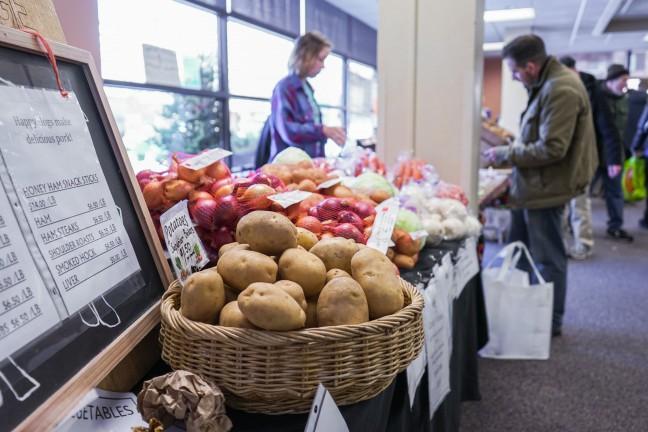The state of Wisconsin is now a part of the Biden Administration’s Rural Partners Network, after officials visited the Menominee Tribal Enterprises sawmill at the beginning of November.
The expansion of the program includes four other states — Alaska, Nevada and North Carolina in addition to Puerto Rico.
The main goal of the RPN is to connect rural communities and businesses to federal support meant to create prosperity in local regions by creating jobs, developing infrastructure and improving the community at large. The RPN also provides farmers with an opportunity to be involved in policymaking and to request federal funding.
According to the RPN website, the network is led by the U.S. Department of Agriculture Rural Development, and its members help rural communities find resources to structure their communities’ futures.
The expansion of the RPN to Wisconsin opens the door for many farming and agriculture-based communities to improve their living conditions after the losses felt by these communities throughout the pandemic.
Over the past two years, Wisconsin farmers have struggled in many different ways. The long list of complex problems faced by local farmers included mental health crises, labor shortages, supply chain issues and meat processing backlogs. Thirty-six Wisconsin farms filed for bankruptcy in 2021, and since the year 2000, Wisconsin has lost 68% of its dairy farms.
But, there is hope on the horizon as the USDA predicts that net farm income will increase by $7.3 billion from last year’s net income in 2022. Some of this bounce back could be a result of the pandemic subsiding throughout 2022 as operations in most industries begin to return to pre-pandemic levels of success.
With these improvements in the farming industry, the intervention of the RPN has the opportunity to maintain this upward momentum for farmers in Wisconsin. The program will include support for 12 different Wisconsin counties, including Ashland, Iron, Price, Eau Claire and others. Notably, the entire Menominee Indian Tribe of Wisconsin would also be included in this initiative.
The RPN could benefit Wisconsin uniquely by providing additional support to local Indigenous populations. Wisconsin is home to 11 federally recognized Indigenous nations — as well as other non-federally-recognized tribes — many of which are intricately connected to the Wisconsin agricultural industry.
The RPN has already begun to foster these unique partnerships by expanding the program that provides federal grant money to the College of Menominee Nation.
This partnership certainly has the ability to aid Wisconsin farmers. One of the biggest problems facing farmers in Wisconsin is a lack of workers. In October 2022, for example, Wisconsin dairy farmers hosted a press conference where they encouraged the U.S. Senate to fix agricultural labor shortages by relaxing immigration policy.
As one of the primary functions of the RPN is to create job opportunities, the labor shortage crisis in rural Wisconsin could easily be solved through a unified response by the federal government and the RPN.
One important question to ask at this point is why, if Wisconsin farms and communities were struggling so immensely, did the initial launch of the RPN neglect to include the state?
Men’s Basketball: Badgers win ‘Brew City Battle’ against Stanford Cardinal
The initial launch of the program in April 2022 provided support to Georgia, Kentucky, Mississippi, New Mexico and Arizona. It is likely that the reason Wisconsin was not included in this initial launch was because of the complexities involved in its agricultural industry.
The program first launched in Arizona to support Indigenous communities and in the other respective states to focus exclusively on farming communities. Because Wisconsin has not only a rich Indigenous background but also a rich agricultural background, it is likely that the program was hesitant to launch in Wisconsin if it would face conflicting interests between the state’s agricultural and Indigenous communities.
The RPN is certainly a step in the right direction for Wisconsin farms, agricultural and Indigenous communities, but it is a fully federal program. There are certainly areas in which state and local governments could assist farmers in their future successes like that of the RPN.
Primarily, as was done in 2020 and 2021, the state could provide grants for Wisconsin farms that are on the brink of collapse. An expansion of this Wisconsin Farm Support Program could help bail out those 36 farms that filed for bankruptcy in 2021. Similarly, the state’s Farmer Wellness Program could be expanded to offer even more mental health services to farmers, such as creating more group therapy sessions within counties across the state.
The Wisconsin state government could also lighten labor requirements for farms and rural communities to allow farms to hire more immigrants, similar to what the Wisconsin dairy farmers demanded of the Senate.
Though the Rural Partners Network only recently expanded into Wisconsin, the potential benefits the program could bring to rural and Indigenous communities are immense. Hopefully, the program will be able to provide labor and support to these communities which are the backbone of the Wisconsin economy.
Emily Otten ([email protected]) is a junior majoring in journalism.





















